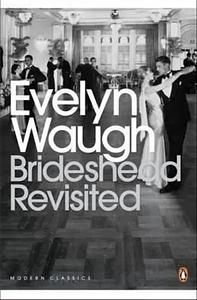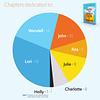Take a photo of a barcode or cover
challenging
emotional
funny
inspiring
mysterious
reflective
sad
slow-paced
Plot or Character Driven:
A mix
Strong character development:
No
Loveable characters:
Yes
Diverse cast of characters:
No
Flaws of characters a main focus:
Complicated
2.5 stars
Brideshead Revisited is an English novel that follows protagonist Charles Ryder and his relationship with the aristocratic Flyte family in the 1920s through to the 1940s. Charles is brought into Sebastian Flyte's inner circle of eccentric and flamboyant friends, and develops a clear connection and affection with Sebastian that eventually wanes as Sebastian struggles with alcoholism and distances himself from his family. We continue to follow Charles through his own struggles, including a divorce and his relationship with Sebastian's sister Julia.
There were plenty of things about this book that made it seem like it would be right up my alley. There's funny lines and lavish descriptions, but there's also bloated sentences, insipid characters and a whole lot of Catholic guilt. Unfortunately I just found it really hard to get into and probably didn’t appreciate it as much as I could have. It's the kind of book you're made to read in highschool - you know it's objectively good, but you're not going to be rushing out to recommend it to anybody.
Brideshead Revisited is an English novel that follows protagonist Charles Ryder and his relationship with the aristocratic Flyte family in the 1920s through to the 1940s. Charles is brought into Sebastian Flyte's inner circle of eccentric and flamboyant friends, and develops a clear connection and affection with Sebastian that eventually wanes as Sebastian struggles with alcoholism and distances himself from his family. We continue to follow Charles through his own struggles, including a divorce and his relationship with Sebastian's sister Julia.
There were plenty of things about this book that made it seem like it would be right up my alley. There's funny lines and lavish descriptions, but there's also bloated sentences, insipid characters and a whole lot of Catholic guilt. Unfortunately I just found it really hard to get into and probably didn’t appreciate it as much as I could have. It's the kind of book you're made to read in highschool - you know it's objectively good, but you're not going to be rushing out to recommend it to anybody.
reflective
sad
slow-paced
Plot or Character Driven:
Character
Strong character development:
Yes
Loveable characters:
No
Diverse cast of characters:
No
Flaws of characters a main focus:
Yes
one part deliciously decadent : other, wickedly sacred
.
.
always in between two opposing, engaging ends -- not once static ; an exhilarating read filled with clever writing and full-bodied characters : the kind that leaves a lingering impression, often leading one to built entire personalities out of it
.
.
always in between two opposing, engaging ends -- not once static ; an exhilarating read filled with clever writing and full-bodied characters : the kind that leaves a lingering impression, often leading one to built entire personalities out of it
On the back of my copy of the book, a quote from a review in The Independent states that this story "has exerted a powerful hold on the British imagination for more than sixty years ...". I'm not British, but it's certainly done that for me. Inspired to re-read it by having recently read Philip Eade's excellent biography of Evelyn Waugh, it was a nostalgic return to a world that's always captivated me. Fittingly, as the story itself is a nostalgic return to a once enchanted world . This edition of Brideshead also included a preface by the author written in 1959, hardly contemporary in terms of literary commentary, but fascinating by virtue of the author's objective look back at his original 1945 conception. In this he confesses his theme was "perhaps presumptuously large" but nevertheless refuses to apologise for it. He also notes that the climate of wartime privation in which he wrote prompted him to infuse the book with a certain gastronomic "gluttony". Being a lover of gastronomy I had no complaint about his lyrical depictions of food and wine, even if at times they verged on a kind of Rick Steinian flamboyance. In line with a number of later reviews, he admits that he "piled it on rather" and his prose often succumbed to self-indulgence, the tortured metaphor - what today would be condemned as 'purple prose'. Then again, one person's 'purple prose' is music to the ears of another more poetically inclined reader. It can be a fine line, but that's another argument.
With its unashamed preoccupation with an aristocratic and elitist world view, it has, like the author himself been derided for its snobbishness. I don't think this detracts from the work and should be read for what it is - the reconstruction of a certain time and a certain society, archaic now and politically incorrect in the extreme, but not an elegy as some have claimed. To me it seems simply a factual rendering of a particular world and the characters that inhabited it, and while they are unashamedly snobbish, is this a reason to condemn the rendering?
While every character is vividly and masterfully wrought, the most compelling, at least for me, was Brideshead itself. Here, in the description of the protagonist's first idyllic summer at Brideshead, to complain of over-gilding is to quibble, surely.
"It is thus I like to remember Sebastian, as he was that summer, when we wandered alone together through that enchanted palace; Sebastian in his wheel chair spinning down the box-edged walks of the kitchen gardens in search of alpine strawberries and warm figs, propelling himself through the succession of hothouses, from scent to scent and climate to climate, to cut the muscat grapes and choose orchids for our buttonholes ..."
and then again, towards the end, looking back -
"... the prospect one gained at the turn of the avenue, as I had first seen it with Sebastian, of the secluded valley, the lakes falling away one below the other, the old house in the foreground, the rest of the world abandoned and forgotten; a world of its own of peace and love and beauty; a soldier’s dream in a foreign bivouac; such a prospect perhaps as a high pinnacle of the temple afforded after the hungry days in the desert and the jackal-haunted nights."
While some critics don't consider this a brilliant book, it's generally regarded as Waugh's finest and certainly most memorable. A large part of what makes it so, I think, is that rather like Frances Hodgson Burnett's "The Secret Garden", it conjures up magic. A magic that may resonate with faithful fans like me, but sadly wasn't strong enough to dispel the angst of the emotionally tortured souls who inhabited it.
With its unashamed preoccupation with an aristocratic and elitist world view, it has, like the author himself been derided for its snobbishness. I don't think this detracts from the work and should be read for what it is - the reconstruction of a certain time and a certain society, archaic now and politically incorrect in the extreme, but not an elegy as some have claimed. To me it seems simply a factual rendering of a particular world and the characters that inhabited it, and while they are unashamedly snobbish, is this a reason to condemn the rendering?
While every character is vividly and masterfully wrought, the most compelling, at least for me, was Brideshead itself. Here, in the description of the protagonist's first idyllic summer at Brideshead, to complain of over-gilding is to quibble, surely.
"It is thus I like to remember Sebastian, as he was that summer, when we wandered alone together through that enchanted palace; Sebastian in his wheel chair spinning down the box-edged walks of the kitchen gardens in search of alpine strawberries and warm figs, propelling himself through the succession of hothouses, from scent to scent and climate to climate, to cut the muscat grapes and choose orchids for our buttonholes ..."
and then again, towards the end, looking back -
"... the prospect one gained at the turn of the avenue, as I had first seen it with Sebastian, of the secluded valley, the lakes falling away one below the other, the old house in the foreground, the rest of the world abandoned and forgotten; a world of its own of peace and love and beauty; a soldier’s dream in a foreign bivouac; such a prospect perhaps as a high pinnacle of the temple afforded after the hungry days in the desert and the jackal-haunted nights."
While some critics don't consider this a brilliant book, it's generally regarded as Waugh's finest and certainly most memorable. A large part of what makes it so, I think, is that rather like Frances Hodgson Burnett's "The Secret Garden", it conjures up magic. A magic that may resonate with faithful fans like me, but sadly wasn't strong enough to dispel the angst of the emotionally tortured souls who inhabited it.
Absolutely loved this book. One of the truest novels I've ever read about what it is to be young and what it is to grow old. I think it's the perfect novel about youth. So beautiful it made me want to cry. Elegant and profoundly sad writing with a strong line of sharp humor threaded through. The second half with Julia was a bit slow but the over all experience of this book was completely worth it. Another classic that deserves to be a classic.
Evelyn Waugh, you are a favorite. Read this because of Saltburn, then I watched the 2008 movie. Loved it. No plot, just vibes and written to perfection.
emotional
sad
medium-paced
Plot or Character Driven:
Character
Strong character development:
Yes
Loveable characters:
No
Diverse cast of characters:
No
Flaws of characters a main focus:
Yes
emotional
sad
medium-paced
Plot or Character Driven:
Character
Strong character development:
Complicated
Loveable characters:
No
Diverse cast of characters:
No
Flaws of characters a main focus:
Yes
challenging
emotional
reflective
slow-paced
Plot or Character Driven:
Character
Loveable characters:
Yes
Flaws of characters a main focus:
Yes
perhaps all our lives are merely hints and symbols; vagabond-language scrawled on gate-posts and paving stones long the weary road that others have tramped before us
4 years ago, I read this book and remembered absolutely nothing of it until I finally watched the movie and realised I owned the book, and so I decided to give it a re-read. and Oh! I absolutely adore it. It's not to say that it's perfect. But Waugh's writing is so beautiful -- if I could highlight every single sentence in this book, I would.
It's hard to pinpoint exactly what I love about this book, when in fact it just follows the life of Charles Ryder and his entanglement with the Marchmains. Maybe it's just the romantic in him -- it feels as though everything he sees and experiences could belong in a painting. I'm a sucker for these sort of things.
Have I watched Saltburn? Yes, indeed. Is there a similarity? If only you go through every second with the book in hand. I see the vibes yes. The actual movie adaptation was alright, only after I finished the book did things become clearer. I would say for you to watch the movie / the show (not! Saltburn) first and then read the book.




